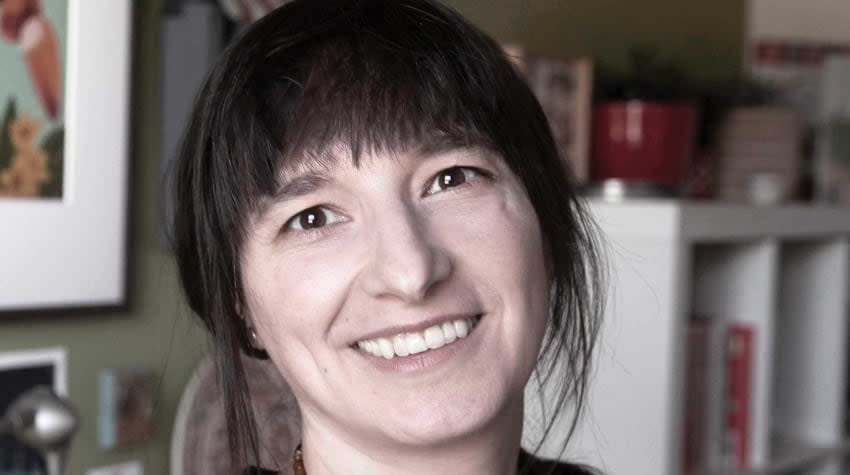Quebec children's author rejects accusations of antisemitism as books removed from library's shelves

Quebec writer and illustrator Élise Gravel, one of the province's best-known authors of children's literature, has come under fire for her online posts.
Since the Israeli-Palestinian conflict erupted in October, Gravel has voiced her views on social media, accusing the Israeli government of bombing children and oppressing Palestinians — comments that have upset some members of Quebec's Jewish community.
In response, Montreal's Jewish Public Library has removed her books from its open shelves. At the same time, the Centre for Israel and Jewish Affairs (CIJA), which represents Jewish federations across the country, has accused her of antisemitism.
But the author isn't backing down and rejects the accusations of intolerance.
The Jewish Public Library told CBC that Gravel is "one of Quebec's most beloved children's book authors" and her work is "widely recognized for her contributions to children's literature."
In a statement, the library said that "while the content of her books is objectively not offensive, we have taken the decision to relocate them from our open shelves to closed stacks."
Moving the books, the library said, "ensures that the books remain accessible through our catalogue, while also acknowledging the sensitivities surrounding the author's social media posts."
The library does not belong to the city of Montreal.
CIJA's Quebec vice-president, Eta Yudin, says that the author's posts are one-sided.
"We didn't hear her talk about the barbarism, the rape, the hostages taken on Oct. 7th," she said.
Yudin also says Gravel is spreading falsehoods and engaging in antisemitic tropes, conspiracy theories and myths.
"People are very upset with what they're seeing in her illustrations and in her posts that clearly cross the line, whether intentionally or not … the kind of material that fuels antisemitism," said Yudin.
On social media networks like Facebook and X, formerly known as Twitter, CIJA disapproved of the use of the word "they" in one of Gravel's posts that the group says read "They are convinced that we are okay with their idea to exterminate the Palestinians, like vermin. Even children, even newborns."
Gravel has since changed the first "they" to "Netanyahu and his allies" in what she said in the comments below the post was a clarification "because people are always trying to find a hateful meaning in every one of my posts," adding that she was not speaking about a specific religious or ethnic group committing violence.
Author stands by her words
Gravel told CBC she will continue to speak out, despite what she calls attempts to silence her.
Montreal-based civil rights lawyer Julius Grey is representing Gravel. Grey told CBC he and his client are taking legal action — not against the library but "the individuals who have been harassing her" and making "personal accusations."
Gravel says she has received death threats because of her online comments.
''The fact that I'm very vocal about my support for the Palestinian cause seems to upset many people," she said.
Describing herself as an activist, Gravel says that her support for transgender children also opened her up to criticism.
This morning, a post on Gravel's Instagram account defended her position. "No, my posts are not antisemitic. I criticize the Israeli government, their political agenda and their extreme violence," the post reads.
"I stand firmly against any form of discrimination and racism, including antisemitism," the post goes on to read. "The Israeli government does not represent the views of every Jew on the planet. Criticizing the state of Israel is not antisemitic."
A Nov. 12 post reads, "Don't blame the Jews. Blame Netanyahu."
Others describe the expulsion of Palestinians from their homes when Israel was created in 1948.
Some posts use the words "apartheid" and"genocide" to describe Israeli policies toward Palestinians.
Intellectual freedom
In a statement, the Quebec Public Library Association (ABPQ) told CBC that it did not know enough about the situation to comment but said "Quebec's public libraries defend intellectual freedom."
Quebec's public libraries "reject all forms of censorship, whether ideological, political, religious or driven by commercial pressures," the ABPQ said.
Ericka Alneus, Montreal city councillor for Rosemont–La Petite-Patrie, also rejects censorship.
"As we speak today, Élise Gravel's books are still in our libraries and they will remain in our libraries," said Alneus, who is responsible for culture and heritage at the city.
Despite sensitivities around the Israeli-Palestinian conflict, Alneus said that libraries need to express a diversity of points of view, even if some members of society disagree or find the issue at hand "uncomfortable."
"It is our job to make sure that freedom of expression and freedom of creation remain," she said.

